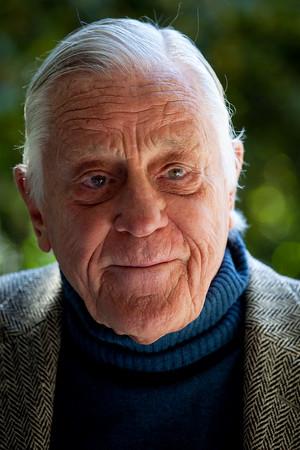Bradlee: the Editor Who Showed Us How Important Editors Are
By • November 6, 2014 0 844

Watching the stately, almost state, funeral at the National Cathedral for the Washington Post legend and newspaper giant Benjamin Crowninshield Bradlee was to realize just what a multi-faceted life he led, almost redefining the definition of the phrase “full life.”
It was a ceremony and celebration of a life which was at once a kind of world, certainly national, and fully American but also a life that was purely, dense and layered, intimate, familial and familiar life.
All of those strands seemed to be weaving themselves together on national television—on C-SPAN, to be specific—as we watched. Here was the coffin with a white rose on top. Here were the Episcopal rituals, the march to and from of church officials and acolytes, the sometimes unsteady walks to the place where speakers spoke and memorialized, the voices, the hymns, prayers and passages from the bible, and poems and quotes and jokes, and fond memories. The high and the more or less mighty—Vice President Joe Biden and Secretary of State John Kerry—were in the pews, mixed in with newspaper guys and gals, the family, the many children, the Georgetown neighbors, the peers and people who write about such things as the passing of legends, and record them for future books and next-day or instant stories.
It seemed a lot like the funeral of Bradlee’s former boss, Katharine Graham, the publisher of the Washington Post, at which Bradlee delivered a eulogy, tapping the casket as he proceeded to the podium. Dignitaries gathered in 2001 in large numbers, as if heeding the call that went out to the world, coming from far and wide. But in some ways, it was not. It was a little closer and more focused—this was about family, two of them. There was the family of one man and his marriages, the children grown older, remembering intimate, funny, triumphant moments of fathers and sons, and there was the family of the profession.
If Bradlee with his life-affirming, arms-wide-open charm and blunt humor was a certain kind of personality, he was and will be remembered by some of us—including the stars of the newspaper that he nurtured, cattled-prodded, pushed and shoved with grit and imagination into national prominence—as an editor. He was THE editor, managing and otherwise, at once singular and of a type. Nobody who made their lives around stories and words, and worked on newspapers or magazines and who lived in this city and in the nation, did not at one time or another aspire to or wished it to have worked for the paper and the man. We all envied the Posties a little, even as we might have disparaged them publicly. They reflected the virtues of their boss which included a respect for the craft of stringing words together into stories, or as he liked to call them “good yarns.”
If Bradlee, and by extension the Post itself, were a kind of hallmark of newspapers and newspaper work, in this setting, the celebration of Bradlee’s life also often seemed like a kind of mass mourning of the continued diminishment and newspapers and newspaper work in general in the digital age. Jeff Bezos, founder of Amazon.com, who bought out the Graham family to acquire the Post was there, like a reminder of today’s realities.
But Bradlee stories—affectionally and sometimes politely told, and sometimes not—reminded journalists who listened and watched of just how crucial editors can be, not only to the fates of entire newspapers but to the work of writers.
There can be only one Bradlee—that life, that look, tragedy and romance, affairs of the heart and national security affairs, the downfall of a president—but there have always been better than good editors whose presence and style affected the people who worked for them. Some had biographies written about them, most are unsung in the long run.
I worked for a city editor named Mike Nickel at the Daily Review, in Hayward, Calif., in the East Bay near Oakland, across the bay from San Francisco, in the 1970s. Contrary to rumor, Ben Bradlee did not invent the New Journalism, a style of writing and reporting that was immediate and personal which he encouraged in his great invention of the Style section. It was already being done in California at Rolling Stone and newspapers in the Bay Area. Nickel did not have an ounce of the charisma Ben Bradlee had, nor that sense of his own worth and importance but he had a way with writers—he was a small, thin man who always let you know when you screwed up, in great detail, but also followed almost every tongue or note-lashing with words of praise for your other efforts. He suspected that I was plotting to get four-letter words into the paper, which was not exactly true, but I, and everyone else at the paper, knew he had my back and whatever else was worth protecting.
Editors like Bradlee are once-in-a-lifetime occurrences. Good and great and excellent men and editors are a vanishing breed. These are the times we live in.
Here’s to Benjamin Crowninshield Bradlee, the best of the breed. And drink a cup of kindness, too, to the Mike Nickels of our shrinking profession.

